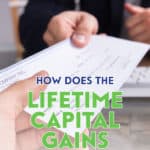How Does the Lifetime Capital Gains Exemption Work?

As of January 2019, the Lifetime Capital Gains Exemption (LCGE) increased to $866,912, having been indexed to the official rate of inflation each year since 2015. For qualifying farm or fishing properties, the exemption is $1 million, with no index for inflation. But what exactly does all of this mean, and how might you benefit from it? Let’s take a closer look.
What is a Capital Gain and How is it Calculated?
Generally speaking, a capital gain is the sale price of a capital property, less the adjusted cost base (ACB). The ACB includes the purchase price, any expenses related to the purchase, and the cost of any capital improvements made to the property.
In Canada, capital gains are taxed at 50%. So, to use a basic illustration, if you realized a capital gain of $100,000, you would pay tax on $50,000. How much you pay would depend on your marginal tax rate, which takes into account your various sources of earned income.
Will I Qualify for the Capital Gains Exemption in Canada?
For the average investor, the short answer is that no, you likely won’t be able to qualify for the LCGE. That’s because chances are, you don’t hold a qualifying property. There are other ways for individual investors to avoid paying capital gains tax, which is something I’ll touch on a bit later. But first, let’s examine the 3 types of capital property that qualify for the lifetime capital gains exemption.
1. The Sale of Qualified Small Business Corporation Shares (QSBCS)
If you, as an individual or as part of a partnership, or someone related to you, owned shares in a Canadian controlled private corporation, then you could qualify for an LCGE when you sell the shares. There are some other qualifying criteria, for example, you would need to have owned the shares for at least 24 months prior to the disposition. Shares in mutual funds, or publicly traded corporations don’t qualify.
2. Qualified Farm Property
If you or your spouse individually, or as part of a group, hold an interest in a farm property, you can qualify for the LCGE if you sell shares in the farm, real property ie. land or buildings, or quotas, such as milk or egg.
3. Qualified Fishing Property
Similar to the farm property, shares in a fishing corporation, fishing vessels, or fishing licenses can potentially be disposed of under the capital gains exemption. Needless to say, it’s important to make sure you understand all of the criteria before proceeding with the sale of capital property.
Definition of a Qualified Small Business
For your business to qualify for the exemption, it must be a private corporation in which at least 90% of its assets were used to carry on business in Canada. It cannot be a publicly traded company, or any of the following: a professional corporation, a specified financial institution, a company whose primary business is the leasing, development, or sale of real estate (land or buildings), or a company where more than 50% of its fair market value is tied to real estate (land or buildings).
Capital Gains Exemption – Glossary Of Terms
Here is a glossary of some of the terms you’ll need to be familiar with when considering a capital gains exemption in Canada:
Adjusted Cost Base (ACB) – refers to the cost of a property, including any expenses related to the purchase, including commissions and other fees. The cost of a property also includes any additions or capital improvements made to the property.
Capital Gain – A capital gain is realized when you sell a capital property for more than the adjusted cost base, including the fees and other expenses related to the sale.
Capital Loss – The opposite of a capital gain, a capital loss occurs when a property is sold for less than the amount for which it was acquired.
Deemed Disposition – This is a term used to describe when a property is “deemed” to have been disposed of, without a sale having taken place. This could occur when a person ceases to be a resident of Canada, or becomes deceased.
Fair Market Value – refers to the highest price you can get for your property if you were to sell it on the open market.
Lifetime Capital Gains Exemption (LCGE) – A cumulative capital gains deduction, available to Canadians who dispose of a qualifying property.
Outlays and Expenses – This refers to any costs you incur to dispose of a capital property.
Proceeds of Disposition – The amount you sold the property for, including all fees associated with the sale.
Real Property – Also known as real estate, this is considered property that cannot be moved, such as land, or a building.
How Can a Regular Investor Benefit from a Capital Gains Exemption
As I mentioned earlier, the vast majority of Canadians won’t qualify for the LCGE, as most don’t hold shares in a privately-controlled Canadian corporation. That said, there are perfectly legal ways to avoid paying tax on capital gains. Two of the most common, are the sale of a primary residence, and capital gains earned on securities held inside a TFSA.
When you sell your primary residence, the capital gain would represent the sale price, less the cost of purchasing the property, and any eligible improvements. Thankfully, in Canada, the government allows you to take the profits from your sale, without having to claim the capital gain. The same does not apply on the sale of an investment property, such as a rental unit or home.
The Tax Free Savings Account (TFSA) was introduced in 2009 and has been providing Canadians with tax-sheltered savings ever since. You can purchase just about any type of security inside a TFSA, including stocks, mutual funds, and ETFs.
The best part is that the lifetime growth, including any capital gains, is completely exempt from tax. The lifetime contribution limit for someone who has never held a TFSA account is $63,500 in 2019. Opening separate accounts for you and your spouse doubles your effective contribution amount to $127,000.


Comments
Thanks for providing this type of info , I enjoy reading articles like yours – it is very helpful and removes doubts about things that otherwise would not be clear in our minds.
good day
Hello Tom,
Thank you so much for this enlightening article!
Regarding your point on TFSA’s, how can I use a TFSA to shield myself from taxes due to such an investment, if TFSA’s usually hold shares from publicly-traded companies and not those from privately-controlled Canadian corporations?
Hi Shan, sorry if I added confusion there, the point about the sale of a primary residence and capital gains inside a TFSA was more of a “what to do instead”. That those are more widely available ways to not pay tax on capital gains since most people will not be in a position to benefit from the LCGE.
Hi Tom,
After reading your article saying that professional corporations cannot be qualified small business corporations for purposes of the LCGE, I contacted CRA to verify this. I have had several conversations and responses from agents at the Dedicated Telephone Service – none of which have been able to say definitively, or provide ITA references to support, that shares of a professional corporation cannot be QSBC shares. They often reference the CRA’s own document T4037 (which is a guide for claiming the capital gains deduction), in which it says that an “eligible small business corporation does not include…a professional corporation”. But, that document does not have the force of law. I am now waiting for a response from the Income Tax Rulings Directorate.